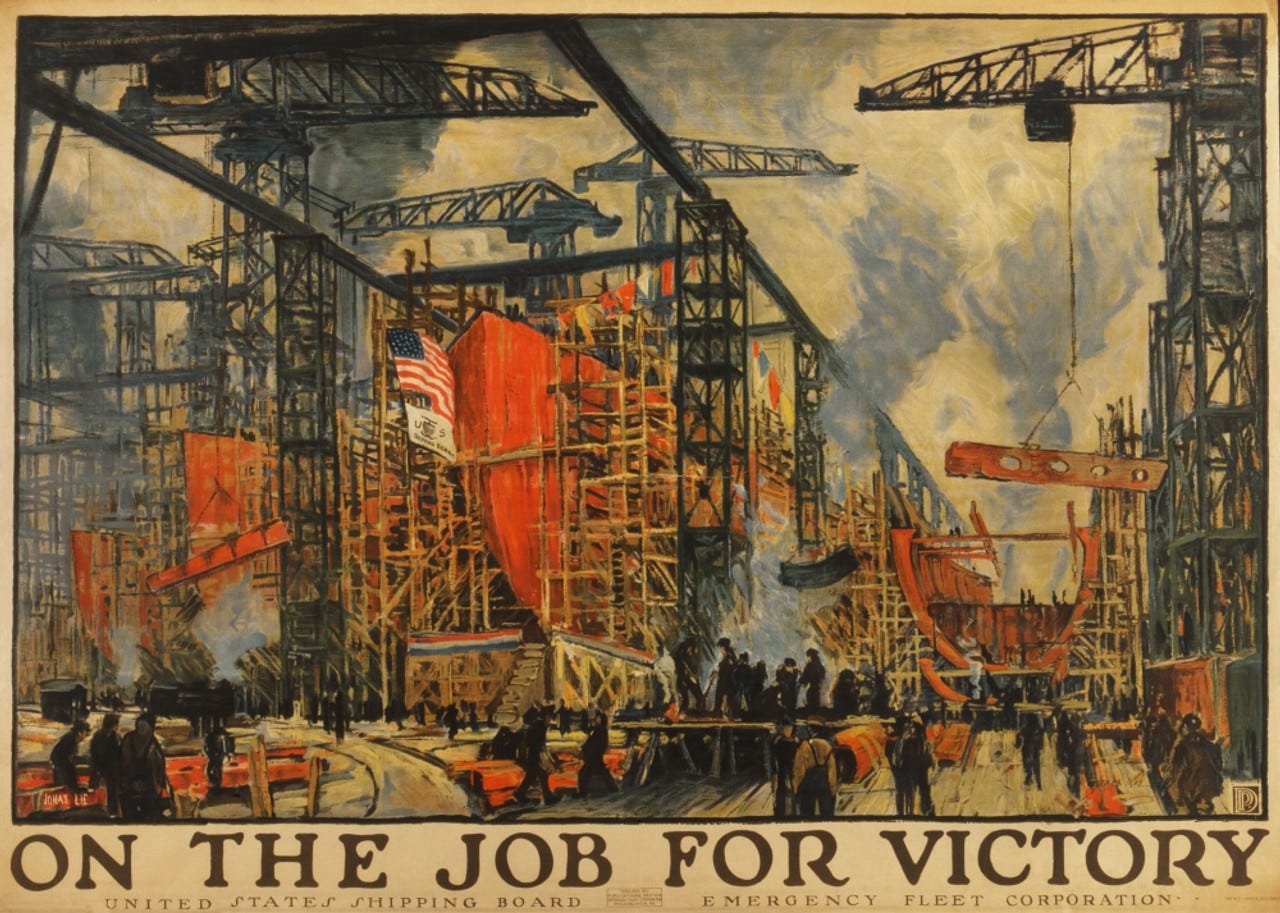Will Wins Wars, Not Just Weapons
We must forge an iron will to win alongside new defense technology.
The motto of San Francisco is “oro en paz, fierro en guerra” (gold in peace, iron in war). While Silicon Valley has long embraced “gold in peace,” it is now turning its ingenuity towards “iron in war” by developing advanced defense technology. Yet, as history reminds us, technological superiority alone does not guarantee a strong military capable of victory. The will to win must be forged alongside the weapons of war.
The Defense Tech Renaissance
Silicon Valley has become interested in developing defense technology because of the success of companies like SpaceX, Palantir, and Anduril coupled with the outbreak of war in Ukraine and Israel. Leading VC firm Andreessen-Horowitz (a16z) launched a fund in 2023 dedicated to backing “American Dynamism” companies. Y Combinator, the premier startup school, funded its first defense startup, a company building cruise missiles. Dozens of patriotic builders have established a haven of hard-tech and defense-tech companies in Los Angeles affectionately known as The Gundo.
This increased interest in defense technology is certainly needed; policy-makers have long pointed out the military’s declining readiness for war against a technological peer. While the United States has had recent military experience, like a boxer telegraphing a punch, our adversaries have been watching and developing weapon systems geared specifically towards our advantages. China has developed missile systems to overwhelm our bases in the Pacific, technology to detect and neutralize US air power, and weapons to destroy US carriers. In other words, the United States military is like Google, complacent, arrogant, and bloated because of continuous domination, but likely to be disrupted by a more nimble, technologically superior competitor like OpenAI or Perplexity.
These efforts to maintain technological superiority, or at least parity, in our military are necessary, but I fear they overlook the human element of fighting wars. Marc Andreessen, a major investor and key thinker in Silicon Valley, recently argued that technology underpins American strength, but history shows that military success requires more than technological superiority.
Technology is Not Enough To Win Wars
While technology plays a key role in military effectiveness, it is not sufficient for a military to win wars. In fact, a belief in technological superiority breeds arrogance that can be exploited by a more dedicated foe. A case in point is the American Revolution. The British were a global superpower, while the Americans were poorly equipped and poorly trained. Yet, through force of will and astute political maneuvering to secure French support, the colonists defeated a technologically superior foe.
Despite our founding history, we have often forgotten that “where there’s a will, there’s a way.” In Korea, despite winning World War II just five years prior, the United States Army was pushed back by both the North Koreans and Chinese, who lacked sophisticated technology. Likewise, a technologically advanced United States was defeated by the determined Vietnamese.
More recently, adversaries armed with nothing more than box-cutters and golf carts exploited the complacency of technologically superior nations during 9/11 in the United States and 10/7 in Israel.
What modern technologists overlook is the importance of the will to fight. It takes a determined people to suffer through war and win military victory, regardless of the technological advantage. In Vietnam, the American public could not stomach the cost of blood over an ideological hypothesis while incidents of fragging highlighted the severe breakdown in morale among draftees. Despite our superior technology, we lost because we did not want to win.
The American Will to Win
As a society, we want to win wars, but we don’t want to spend blood. This aversion to bloodshed was born of the horrors of the Civil War, where more men died in 30 minutes at Antietam than in 30 days of the Normandy beachhead. In both of the World Wars, our allies bore the brunt of the casualties, reinforcing our desire for and belief in cheap victories. However, in a recent wargame of a Chinese invasion of Taiwan, American, Taiwan, and Japan forces successfully defeated the invasion of China in most scenarios, but at the high cost of dozens of ships, hundreds of aircraft, tens of thousands of troops, and the devastation of the Taiwanese economy.
Technologists are optimistic that the use of technology like drones would avoid the deaths of service members while maintaining lethality, allowing us to have our cake and eat it too. However, they forget that ground troops are necessary to effectively dominate a land, particularly when trying to avoid civilian casualties. Fehrenbach, both a historian and veteran of the Korean War, observed that:
“Americans in 1950 rediscovered something that since Hiroshima they had forgotten: you may fly over a land forever; you may bomb it, atomize it, pulverize it and wipe it clean of life—but if you desire to defend it, protect it, and keep it for civilization, you must do this on the ground, the way the Roman legions did, by putting your young men into the mud.” (This Kind of War)
If we must fight a war, we must be willing to suffer the inevitable loss of life to reduce civilian casualties and ensure an economic turnaround for the survivors. However, it is unclear if America is cultivating citizens willing to suffer and able to fight abroad.
American pride remains near record lows, with the percentage of 18- to 35-year-old Americans who say they are extremely proud to be American at just 21%, compared to 40% of those aged 35 to 64, and 54% of those 55 and older. Worse, four in ten members of Gen Z say that America’s Founding Fathers are better described as villains than heroes while two in three agree that “America is an unfair society.”
Most members of Gen Z are not even eligible to join the military, fueling a recruiting crisis. The military has reported that only 23 percent of young people between 17 and 24 even qualify to join because of a lack of physical fitness, widespread mental illness, and drug use. Scores on the military’s standardized exam for recruits plummeted during the pandemic. Of those eligible, there are fewer that show the propensity to serve, with less than 10 percent of Americans aged 16 to 21 saying they would seriously consider joining.
Building an Iron Will
While technology companies are busy rebuilding the arsenal of democracy, America must fortify its future by preparing its youth. Several pillars could help cultivate the grit, responsibility, and fortitude necessary to sustain our nation’s strength.
The first pillar is education reform to inspire civic responsibility and pride in American values. Initiatives like the Stanford Civics Initiative and organizations like the Foundation for Excellence in Higher Education are already working to reinforce a sense of duty and responsibility to the country, especially among our future leaders. Expanding these types of programs could encourage a generation to view service and sacrifice as noble virtues.
The second pillar is building physical fitness and mental fortitude. General MacArthur once observed, “Upon the fields of friendly strife are sown the seeds that on other days, on other fields, will bear the fruits of victory.” Youth sports, which are enjoying a resurgence in participation post-COVID, inspire grit, competitiveness, and teamwork. Increased participation could prepare future generations to shoulder the burden of warfare.
The third pillar is a revitalization of youth organizations. Programs like the (Boy) Scouts teach leadership and practical skills such as navigation, camping, or problem-solving. These pseudo-military activities offer a foundation in preparedness and confidence, helping young people embrace challenges with a solutions-oriented mindset.
There are tigers in this world who prey upon the weak and subvert the reasonable. America’s strength lies not just within its innovation and technology, but also on the will of its people. If we are to maintain our strength and leadership on the international stage, we must forge not only the weapons of war, but reinforce the will to wield them abroad.









I would say that this is a pretty accurate assessment of where we are at as a nation. I don't think the defense industry will ever lack for funding and our defense technology as a whole is second to none, but ultimately that doesn't matter if the people don't have a will to fight, and I believe that after decades of a mainly pointless war effort in the Middle East, the public has no stomach for pointless wars, and rightfully so. Even more than that, the military is, from my point of a view, on a precipice, facing fewer people eligible to join and fewer still who'd even want to. I can guarantee that if the US entered another war that the American people did not see as justified, numbers would fall even further, as people refuse to join a military that seeks to further the interest of wealthy elites instead of the nation as a whole. Desires of an isolationist America will probably grow in the future as people look to stay out of further conflict, which isn't a bad thing as far as sparing American lives goes, but will also result in less influence globally in trade and politics. I think encouraging European defense industries will also help maintain the global order in a similar status quo and help the US spend more money inside its borders on the upkeep of its troops and equipment.
Sorry if this is kind of rambly, I'm just writing thoughts down as they come in. I'm a paratrooper facing the loss of my job; the Army is considering getting rid completely of its Airborne battalions in the Guard, as our capabilities are rather lacking when faced with modern air defence capabilities that will be everpresent in any kind of near peer conflict. I think a lot about the future makeup of the army and what it will look like here in five, ten, and twenty years, and whether I will continue to be a part of it. As an infantryman, the idea of waging war without risking lives is attractive, but ultimately unrealistic. As you stated, young men in the mud truly is the only way to actually conquer ground and hold it. We'll see what the future holds.